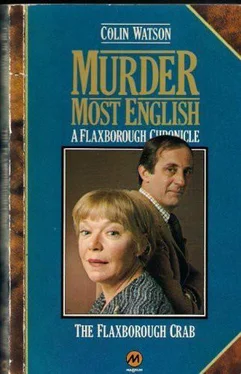A shoe—brown suede, well cut; a neat ankle and calf, finely stockinged; a skirt low enough to be modest without looking dowdy; a slim yet energetic body, dressed one season in arrear but with that kind of informed taste that makes fashion seem beside the point; delicate but capable hands, fluttering now to show pleasure; a face that bespoke no particular age despite its innocence of any but the most elementary make-up; gentle, shrewd eyes...
“Sergeant!” One of the finely shaped hands extended in friendliness. “How delightful to see you again!”
Love grinned and shuffled his feet.
“And how is your Mr Purbright?” asked Miss Teatime, cheerfully.
“He’s very well, thank you, ma’am.”
“Do give him my regards.”
She turned to Brother Culpepper, who had been watching the encounter with obvious approval.
“And have you been showing Sergeant Love our little enterprise?”
“ ’sright.”
Miss Teatime smiled again at Love.
“What monastic modesty doubtless has prevented his telling you is that Brother Culpepper is our guiding genius out here at Moldham. The church’s loss has been our gain. Oh, temporarily, of course—you must not suppose that his Order would part with him for good.”
“I told ’im that. Abaht bein’ on loan, like.”
“Would you care for a cup of coffee, sergeant? Then you could tell me the reason for this very welcome visit.”
She led Love to the cottage and into the room with the addressograph and filing cabinets. They sat on gaunt but quite comfortable steel chairs. Brother Culpepper, whose worldly service apparently extended to the kitchen department, could soon be heard rattling crockery. A couple of minutes later, he brought in a tray and made space for it on the table by elbowing aside some of the packets and labels.
“Back in ’alf ’nour,” he remarked on his way out. “Be seein’ yer.”
“His devotions,” Miss Teatime explained softly to the sergeant. “We give him all facilities, naturally.”
She poured Love a full cup of the strong coffee-and-milk mixture from a jug and passed him a small sugar bowl. Her own cup she less than half filled, then topped it up with a pale amber fluid from a medicine bottle that she took from the white cabinet, painted with a red cross, on the wall behind them.
“Friar’s Balsam,” she said with a little grimace of resignation, putting back the cork. Then, as if by afterthought, she looked inquiringly at Love and held out the bottle. “But perhaps you, too, are a bronchitis sufferer, sergeant?”
Love hurriedly shook his head and pulled his coffee to safety. It was only later, when he caught a steam-borne whiff of a surprisingly alcoholic nature, that he regretted his conservatism.
Miss Teatime sipped her remedy with considerable fortitude.
“I trust that your call has nothing to do with the more depressing aspect of a policeman’s job, Mr Love. It is difficult in the peaceful atmosphere of the countryside to conceive of lawlessness, you know.”
“Well, I can’t say that there’s any lawlessness involved, actually. Mr Purbright just wanted me to have a look and see what was here. He doesn’t know it has anything to do with you, I’m sure.”
“Is he interested in herbal therapy, then?”
Love hesitated. “Well, no, I shouldn’t have thought so. The fact is, we’ve had a bit of trouble in Flax, and this stuff you make here does happen to have been mentioned.”
He blushed and stared into his cup, unhappily aware of the difficulty of deceiving a lady so well-bred as Miss Teatime.
“But surely”—Miss Teatime looked puzzled—“there can be no suggestion of our product having been concerned in this, ah, trouble? It is altogether wholesome, I assure you.”
“Yes, I’m sure it is. The Reverend seemed to think so, anyway.”
“Brother Culpepper? Oh, yes, his judgement is very sound where the fruits of the earth are concerned. But perhaps you can tell me a little more about your inspector’s anxieties?”
Love related the facts of Alderman Winge’s death by drowning following his attempted seduction of Miss Pollock and a subsequent attack of giddiness. He repeated the assertion by Dr Meadow at the inquest that Winge had been dosing himself with Samson’s Salad, which, Love understood, was synonymous with Lucky Fen Wort, as processed and packaged at the Moldham Meres Laboratories. The sergeant forebore from cataloguing the other cases of indecent assault; nor did he mention Mrs Grope’s suspicions concerning association between Fen Wort and the recent disconcerting behaviour of her husband.
Miss Teatime listened to all this with grave and polite attention. Then she replenished his cup and helped herself to a booster shot of Friar’s Balsam.
“How very distressing,” she murmured. “But I am certain that Dr Meadow cannot have meant to blame our Samson’s Salad for what happened to his poor patient. Its action is invigorating but not in the least degree harmful. Indeed, I am only surprised—though relieved, naturally—to hear that Mr Winge did not catch the lady he was pursuing.”
“She was a good runner, by all accounts.”
“That is as well.”
There was a short pause.
“Tell me, though, Mr Love—was the criticism by Dr Meadow voiced publicly at the inquest?”
“Oh, yes. He’d been rather nettled by the deputy coroner, as a matter of fact. The inspector seems to think he was trying to to put himself in the clear.”
“I see.”
The ensuing silence sharpened a feeling in Love that his appearance at Moldham Meres must look odd and even foolish if he could think of no better justification. He had been received very kindly. Everything here seemed to be above board. Surely Purbright would not blame him for being a little more forthcoming.
He found himself saying: “Strictly between ourselves...”
Miss Teatime leaned forward. She looked concerned and very sympathetic.
“...we do have reports of another customer of yours, and it could be that he’s the same way inclined as old Winge.”
“Dear me!”
“That’s how it looks. Confidentially, of course.”
“Naturally.”
“His wife’s very worried. She says he’s taken to interfering with women in shops and collecting, well—you know—garments.”
Miss Teatime found the sergeant’s propensity for blushing most endearing. She nodded understandingly.
“According to her,” Love went on, “all this began when he started taking this herb stuff. That’s according to her,” he added defensively.
“You are being so agreeably frank, sergeant, that I wonder if you would care to divulge the gentleman’s name. I need hardly say that it would go no further.”
“Well...” He hesitated.
“Yes?”
“It’s Grope, actually.”
Miss Teatime pondered, then shook her head.
“No, I’m afraid the name is not familiar to me.” She smiled. “Perhaps I had best forget it again. Now then, is there any other matter in which you think I might be able to help you?”
Love thought not, but thanked her for asking.
When he had gone, Miss Teatime opened a drawer in one of the filing cabinets. After a brief search, she tweaked up a card. It was that of the only Grope on the mailing index. She copied the address into her little memorandum book, resumed her seat at the table, and thoughtfully lighted a slim, black cheroot.
Chapter Eleven
Brother Culpepper re-entered the office some twenty minutes later. When he saw that Miss Teatime was alone, he hauled off his habit and hung it on a hook at the back of the door. Then he slumped into the chair vacated by Sergeant Love and felt in his shirt pocket for a cigarette end and a match. The cigarette end was crumpled and very short. He lit it with his lips pouted well forward and his eyes nearly shut.
Читать дальше












